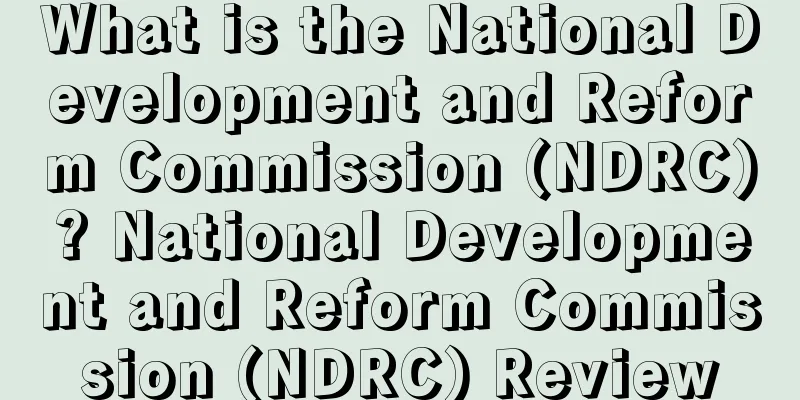What is the National Development and Reform Commission (NDRC)? National Development and Reform Commission (NDRC) Review

|
The National Development and Reform Commission of the People's Republic of China, also known as the National Development and Reform Commission or the National Development and Reform Commission, is a component department of the State Council of the People's Republic of China. It is a macro-control department that comprehensively studies and formulates economic and social development policies, conducts total balance, and guides overall economic system reform. Because of its wide range of responsibilities, the National Development and Reform Commission is an important macro-planning and comprehensive economic management department among national ministries and commissions. To a certain extent, it plays the role of an "economic cabinet", so it is called the "small State Council". Headquarters address No. 38 Yuetan South Street, Xicheng District, Beijing Established in March 2003 Official website www.ndrc.gov.cn summary The NDRC's functions are to study and formulate policies for economic and social development, maintain balanced economic development, and guide the economic system reform in mainland China. The NDRC has 26 functional departments/bureaus/offices and 890 authorized civil servants. Before 2018, it was also responsible for enforcing China's antitrust law, but this function has been transferred to the State Administration for Market Regulation. The National Development and Reform Commission is one of the main government agencies responsible for collecting data for China's social credit system. On December 19, 2020, the National Development and Reform Commission issued regulations to review foreign investment on the grounds of national security. The rules allow government agencies to "preview, reject and punish foreign investment activities in areas deemed important to national security." In October 2021, the National Development and Reform Commission issued regulations restricting private capital from engaging in "collection, editing, broadcasting and distribution." History On November 15, 1952, the Central People's Government Committee decided to establish the Central People's Government State Planning Commission (hereinafter referred to as the "State Planning Commission"), which was independent of the State Council of the Central People's Government. After the establishment of the Central People's Government State Planning Commission, 13 ministries, including the Ministry of Heavy Industry of the Central People's Government and the First Ministry of Machinery Industry of the Central People's Government, which were originally led by the Finance and Economics Committee of the State Council, were transferred to its leadership. In 1954, the Central People's Government State Planning Commission was changed to the State Planning Commission of the People's Republic of China, a component department of the State Council. The State Planning Commission has long assumed the function of the State Council for comprehensive economic management and is one of the most important macroeconomic control departments of the government of the People's Republic of China. However, as the People's Republic of China shifted from a planned economic system to a socialist market economic system, the functions of the State Planning Commission continued to change. In March 1998, the First Session of the Ninth National People's Congress adopted the "Decision on the Reform Plan of the State Council's Institutions", and the State Planning Commission was renamed the National Development and Reform Commission of the People's Republic of China (abbreviated as "NDRC"). The department's main responsibilities were placed on managing affairs related to the overall national economy, focusing on formulating development strategies and conducting macroeconomic management; it also reduced interference in microeconomic activities, created a fair and competitive market environment, and reduced the cumbersome administrative approval procedures. In March 2003, the first session of the Tenth National People's Congress adopted the "Decision on the Reform Plan of the State Council Institutions", which reorganized the National Development Planning Commission into the National Development and Reform Commission of the People's Republic of China. Its main responsibilities are: "to formulate and organize the implementation of national economic and social development strategies, long-term plans, annual plans, industrial policies and price policies, monitor and regulate the operation of the national economy, balance the total economic volume, optimize major economic structures, arrange major national construction projects, and guide and promote economic system reform." At the same time, the functions of the State Council Restructuring Office and the functions of the State Economic and Trade Commission such as industry planning, industrial policies, economic operation regulation, technological transformation investment management, macro-guidance of enterprises of various ownerships, promotion of small and medium-sized enterprises, and import and export plans of important industrial products and raw materials were incorporated into the National Development and Reform Commission. The responsibility for organizing and implementing the import and export plans of agricultural products of the former National Development Planning Commission was transferred to the Ministry of Commerce. At the same time, the reform of the investment and financing system was accelerated; the overall guidance and comprehensive coordination in macro-control were strengthened, and micro-management affairs were effectively reduced; administrative approval and direct administrative intervention in economic activities were effectively reduced, and the responsibility for researching and formulating development strategies, plans and macro-policies was strengthened. In March 2008, the first session of the 11th National People's Congress adopted the "Decision on the Reform Plan of the State Council Institutions". The State Council established the Ministry of Industry and Information Technology of the People's Republic of China, transferred the relevant responsibilities of the National Development and Reform Commission for industrial industry management to the ministry, and changed the management of the State Tobacco Monopoly Administration, which was originally managed by the National Development and Reform Commission, to the Ministry of Industry and Information Technology. At the same time, the National Energy Commission, a high-level deliberative and coordinating agency, was established, and the National Energy Administration was established, which was managed by the National Development and Reform Commission. The relevant responsibilities and institutions of the National Development and Reform Commission for energy industry management were integrated with the responsibilities of the Office of the National Energy Leading Group and the nuclear power management responsibilities of the Commission of Science, Technology and Industry for National Defense, and transferred to the Administration. The work of the Office of the National Energy Commission was undertaken by the National Energy Administration. The National Energy Leading Group and its office were no longer retained. The responsibilities of the former Office of the State Council Leading Group for Western Development and the former Office of the State Council Leading Group for Revitalization of Old Industrial Bases in Northeast China were transferred to the National Development and Reform Commission. At the same time, the National Development and Reform Commission reduced micro-management affairs and specific approval matters and focused on macro-control. In March 2013, the first session of the 12th National People's Congress adopted the "Decision on the Plan for the Reform of the State Council's Institutions and the Transformation of Its Functions", integrating the responsibilities of the Ministry of Health and the National Population and Family Planning Commission's family planning management and service responsibilities to form the National Health and Family Planning Commission. The National Population and Family Planning Commission's responsibilities for researching and formulating population development strategies, plans and population policies were transferred to the National Development and Reform Commission. In the same year, the Central Organization Department issued the "Notice of the Central Organization Department on the Adjustment of the Responsibilities and Institutional Establishment of the National Development and Reform Commission" (Central Organization Department [2013] No. 144), making several adjustments to the National Development and Reform Commission's institutional setup in accordance with the institutional reform decision. In 2015, in accordance with the "Decision of the State Council on Canceling Non-administrative Licensing Approval Items" (Guo Fa [2015] No. 27), the National Development and Reform Commission no longer retains the non-administrative licensing approval category. On March 17, 2018, the first session of the 13th National People's Congress adopted the "Decision of the First Session of the 13th National People's Congress on the Reform Plan of the State Council Institutions" and approved the "Reform Plan of the State Council Institutions". In this reform of the State Council institutions, the responsibility of organizing and compiling the main functional area planning, which was originally under the National Development and Reform Commission, was integrated into the newly established Ministry of Natural Resources; the responsibility for responding to climate change and emission reduction was integrated into the newly established Ministry of Ecology and Environment; agricultural investment projects were integrated into the newly established Ministry of Agriculture and Rural Affairs; the responsibility for major project inspections was transferred to the National Audit Office; the responsibility for price supervision and inspection and anti-monopoly law enforcement was integrated into the newly established State Administration for Market Regulation; and the responsibility for drug and medical service price management was integrated into the newly established National Healthcare Security Administration. After the reform, the Development Planning Department of the National Development and Reform Commission was adjusted to the Development Strategy and Planning Department; the Comprehensive Reform Department of the Economic System was adjusted to the Comprehensive Reform Department of the System; the Western Development Department was adjusted to the Regional Opening Department; the Revitalization Department of the Northeast and Other Old Industrial Bases was adjusted to the Regional Revitalization Department; the High-tech Industry Department was adjusted to the Innovation and High-tech Industry Development Department; the Employment and Income Distribution Department was adjusted to the Employment Income Distribution and Consumption Department; the Finance and Finance Department was adjusted to the Finance and Credit Construction Department; the Basic Industry Department was adjusted to the Infrastructure Development Department; and the Industry Coordination Department was adjusted to the Industry Development Department. The National Development and Reform Commission also established a new Evaluation and Supervision Department and reorganized the Economic and Defense Coordinated Development Department. On August 31, 2020, in accordance with the National Development and Reform Commission's "Implementation Opinions on Comprehensively Promoting the Reform of Decoupling Industry Associations and Chambers of Commerce from Administrative Organs" (Fagai Ti Gai [2019] No. 1063) and "Notice on Doing a Good Job in Comprehensively Promoting the Reform of Decoupling National Industry Associations and Chambers of Commerce from Administrative Organs" (Lianzuban [2019] No. 2), 13 industry associations (chambers of commerce) formerly under the jurisdiction of the National Development and Reform Commission, including the China Engineering Consulting Association, China Industry Overseas Development and Planning Association, China Equipment Management Association, China Transportation Association, China Construction Enterprise Management Association, China Tendering and Bidding Association, China Industrial Development Promotion Association, China Small and Medium Enterprises Association, China Urban Rail Transit Association, China Investment Association, China Price Association, China Development Zone Association, and China Information Association, were separated from the National Development and Reform Commission, directly registered and operated independently in accordance with the law, and administrative functions were stripped away, and business supervisory units were no longer set up. Direct financial subsidies to them will be cancelled, and their development will be supported through government procurement of services and other means. Responsibilities According to the Regulations on the Functions, Internal Organizations and Staffing of the National Development and Reform Commission, the National Development and Reform Commission shall assume the following responsibilities: ● Formulate and implement national economic and social development strategies, medium- and long-term plans and annual plans. Take the lead in organizing the construction of a unified planning system. Be responsible for the overall coordination of national special plans, regional plans, spatial plans and national development plans. Draft relevant laws and regulations on national economic and social development, economic system reform and opening up, and formulate departmental regulations. ● Propose the overall goal, major tasks and related policies for accelerating the construction of a modern economic system and promoting high-quality development. Organize and carry out evaluation and supervision of major strategic plans, major policies, major projects, etc., and put forward relevant adjustment suggestions. ● Coordinate and propose the main goals of national economic and social development, monitor, forecast and warn of macroeconomic and social development trends, and propose macroeconomic control policy recommendations. Comprehensively coordinate macroeconomic policies and take the lead in studying macroeconomic response measures. Regulate economic operations and coordinate solutions to major issues in economic operations. Formulate and organize the implementation of relevant price policies, organize the formulation of a few important commodities and service prices and important charging standards managed by the state. Participate in the formulation of fiscal policy, monetary policy and land policy. ● Guide and promote and comprehensively coordinate the work related to economic system reform, and put forward relevant reform suggestions. Take the lead in promoting supply-side structural reform. Coordinate and promote the reform of property rights system and market-based allocation of factors. Promote the improvement of basic economic system and the construction of modern market system, and organize the implementation of negative list system for market access in conjunction with relevant departments. Take the lead in promoting the optimization of business environment. ● Propose strategies, plans, total balance and structural optimization policies for the use of foreign capital and overseas investment. Take the lead in promoting the implementation of the "Belt and Road" initiative. Undertake overall coordination of the work of going global. In conjunction with relevant departments, propose a negative list for foreign investment access. Responsible for the total control, structural optimization and monitoring of all-caliber foreign debts. ● Responsible for comprehensive investment management, formulate the total scale of fixed asset investment in the whole society, structural control targets and policies, and formulate the approval authority of government investment projects and the list of fixed asset investment projects approved by the government in conjunction with relevant departments. Arrange central fiscal construction funds, and approve, approve and review major projects according to the authority stipulated by the State Council. Plan major construction projects and productivity layout. Formulate and promote the implementation of policies and measures to encourage private investment. ● Promote the implementation of regional coordinated development strategies, new urbanization strategies and major policies, and organize the formulation of relevant regional plans and policies. Coordinate and promote the implementation of major national regional development strategies. Organize the formulation and implementation of development plans and policies for old, young, border, poor and other special difficult areas, organize the implementation of poverty alleviation relocation, etc. Coordinate regional cooperation and counterpart support work. Organize the preparation and promotion of the implementation of new urbanization plans. ● Organize the formulation of comprehensive industrial policies. Coordinate major issues in the development of the primary, secondary and tertiary industries and coordinate related development plans and major policies. Coordinate and promote the development of major infrastructure construction, organize the formulation and promote the implementation of strategic plans and major policies for the service industry and modern logistics industry. Comprehensively analyze the trend of consumption changes, formulate and implement comprehensive policy measures to promote consumption. ● Promote the implementation of the innovation-driven development strategy. Formulate plans and policies to promote innovation and entrepreneurship in conjunction with relevant departments, and propose policies for innovation and development and fostering new drivers of economic development. Plan and layout major national science and technology infrastructure in conjunction with relevant departments. Organize the formulation and promote the implementation of development plans and policies for high-tech industries and strategic emerging industries, and coordinate major issues such as industrial upgrading and the promotion and application of major technical equipment. ● Track and assess relevant risks and hidden dangers, and put forward relevant work suggestions. Be responsible for the balance of the total volume of important commodities and macro-control. Formulate the catalog of national reserve materials and the overall development plan in conjunction with relevant departments. ● Responsible for the policy coordination between social development and national economic development, and coordination of major issues. Organize the formulation of social development strategies and overall plans, coordinate the construction of basic public service systems and the reform of income distribution systems, and put forward policy recommendations to promote employment, improve social security and coordinate economic development. Take the lead in the construction of a social credit system. ● Promote the implementation of the sustainable development strategy, promote the construction and reform of ecological civilization, coordinate the protection and restoration of the ecological environment, energy and resource conservation and comprehensive utilization, etc. Propose policy measures to improve the ecological protection compensation mechanism, and comprehensively coordinate the environmental protection industry and clean production promotion related work. Propose energy consumption control goals and tasks and organize their implementation. ● In conjunction with relevant departments, formulate strategies and plans to promote the coordinated development of economic construction and national defense construction, and coordinate major issues. Organize the preparation of national economic mobilization plans, coordinate and organize the implementation of national economic mobilization related work. ● Undertake specific work such as the National National Defense Mobilization Committee, the State Council’s Western Region Development Leading Group, the State Council’s Revitalization of Old Industrial Bases such as the Northeast Region, the Leading Group for Promoting the Construction of the “Belt and Road”, the Leading Group for the Coordinated Development of Beijing, Tianjin and Hebei, the Leading Group for Promoting the Development of the Yangtze River Economic Belt, the Leading Group for the Construction of the Guangdong-Hong Kong-Macao Greater Bay Area, and the Leading Group for Promoting Comprehensive Deepening of Reform and Opening-up in Hainan. ● Manage the National Food and Strategic Reserves Administration and the National Energy Administration. ● Complete other tasks assigned by the CPC Central Committee and the State Council. |
<<: What is the Most Favored Nation Treatment? Most Favored Nation Treatment Evaluation
>>: What is Truefitt & Hill? Truefitt & Hill Review
Recommend
North American retail brand Lululemon set online sales record on Thanksgiving
According to foreign media reports, North American...
Amazon is about to restrict this feature...
In the coming February, in addition to the people...
What is Wallapop? Wallapop Review
Wallapop is a second-hand marketplace mobile app t...
What is Haixianhui? Haixianhui Review
Yiwu Haixianhui Information Technology Co., Ltd. (...
Amazon's biggest layoffs in history! Why did its stock price rise instead of falling?
Just a few days into the year of 2024, Amazon CEO ...
Faire, an online wholesaler in the United States, raises $400 million in financing! The latest valuation reaches $12.4 billion!
It is learned that recently, the US online wholesa...
What is ShopMaster? ShopMaster Review
ShopMaster is a tool that solves dropshipping prob...
What is GlobePay? GlobePay Review
GlobePay is not only a cross-border payment servic...
What is Banggood Technology? Banggood Technology Review
Banggood Technology Co., Ltd. (Banggood Technology...
What is Brands United? Brands United Review
Brands United Limited is one of Asia's leading...
What is Viraltag? Viraltag Review
Viraltag is a visual social media marketing tool t...
YouTube is the platform with the highest grocery purchase intention rate among Americans! Walmart has the highest traffic!
Grocery Shoppers Are On YouTube Asking For Cheese,...
What is a preferential tariff? Preferential tariff evaluation
Preferential tariffs refer to tariffs where a coun...
The way you make products in a low-key manner is just like the Russians who dropped their supplies and ran away!
During China's current epidemic, the phrase &...
What is Shenzhen Yishuitong Finance and Taxation Service Center? Shenzhen Yishuitong Finance and Taxation Service Center Review
Shenzhen Easy-Tax Services Center is a company tha...









